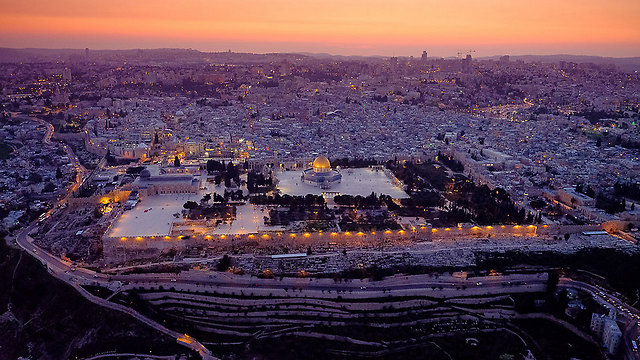
Culture Minister Regev
Photo: Marc Israel Sellem

Regev pushes for extensive Old City excavations in Jerusalem
Culture minister initiates $70-million plan to uncover, preserve and develop historical sites from Har Etzion to City of David; 'This is the best response to those denying our bonds to Jerusalem and the best implementation of the Trump declaration,' Regev says.
Culture Minister Miri Regev has ordered the Israel Antiquities Authority to put plans in motion to undertake far-reaching archeological restoration of many historical Jerusalem sites, in a bid to strengthen Jewish bonds to the ancient city. Should the plan be approved, however, it may arouse stringent condemnation in the Arab world.
 Internal Israel Antiquities Authority documents obtained by Yedioth Ahronoth present the Shalem Project, the name of the five-year plan. The original government decision to go forward with the plan in principle was made this past May, when the cabinet convened in the Old City's Western Wall Tunnels
on Jerusalem Day.
Internal Israel Antiquities Authority documents obtained by Yedioth Ahronoth present the Shalem Project, the name of the five-year plan. The original government decision to go forward with the plan in principle was made this past May, when the cabinet convened in the Old City's Western Wall Tunnels
on Jerusalem Day.

Unlike previous excavations in Israel's capital that focused more on "saving" sites, the current plan deals with planned work to uncover, preserve and develop Jerusalem's Old City from the Har Etzion region to the City of David. The project does, however, exclude the Temple Mount complex, where no excavations are planned.
The plan constitutes a historic initiative, as it marks the first time an official Israeli government agency undertakes widespread excavations in the Old City. The plan is estimated to cost NIS 250 million (roughly $70 million).

The Shalem project to excavate Jerusalem's Old City is set to cost NIS 250 million (Photo: Israel Bardugo)
In its original decision, the government set a 60-day deadline for the Israel Antiquities Authority to present a detailed plan to undertake renovations.
Minister Regev has also appeaked to Prime Minister Benjamin Netanyahu to buedge the project from the budgetary reserves, which are set to be allocated in the coming weeks. The Culture Ministry, meanwhile, provided NIS 10 million of its own budget so works may commence.
Among the sites to be developed as part of the project are the Pool of Siloam, the Spring Fortress, the terraced street climbing from the City of David to the Temple Mount, the Givati parking lot, the Tanners' Gate plaza, the Western Wall's foundations below Robinson's Arch, the Southern Wall's Triple Gate and others. Works are intended to preserve, reconstruct and develop the sites, as well as to make them more accessible to visitors.

Israel Antiquities Authority Chairman Hasson said the plan provided an appropriate response to anyone wishing to dispute Israel's right to Jerusalem (Photo: Gil Yohanan)
"The immense importance of the archeological digs taking place in Jerusalem cannot be questioned. The digs are uncovering the deep roots we have in our land," Israel Antiquities Authority Chairman Israel Hasson in a letter to Regev.
"The digs' results provided the appropriate response to anyone wishing to dispute our right to Jerusalem, alongside the fact the sites are a tourist attraction of the highest order and research being conducted there is foremost in the world," Hasson added.
Regev herself told Yedioth Ahronoth that the desire to strengthen Jewish bonds to the city was at the heart of the initiative. "Even if (Palestinian Authority President) Mahmoud Abbas made an effort to dig hundreds of meters into the ground he will not find a Palestinian coin from 2,000 or 3,000 years ago," she explained.
"This national project is important both on a PR and a touristic level. The reality uncovered when Jerusalem is excavated is worth a thousand words, and is the best response to those denying our bonds to Jerusalem. Excavating ancient Jerusalem, as far as I'm concerned, is the best on-the-ground implantation for President (Donald) Trump's declaration (recognizing the city as Israel's capital—ed)," Regev concluded.















